By: K Vijaya Kumar
Electric vehicles (EVs) are reshaping the world of transportation, and within this transformation, the electric bikes are experiencing a pivotal evolution. The surge in electric two-wheelers is nothing short of extraordinary, with India at the forefront. According to the Economic Survey of 2023, India anticipates a staggering 49% annual growth in its domestic electric vehicle market until 2030, with a target of 10 million EV sales annually. In September 2023, the Federation of Automobile Dealers Association (FADA) reported a remarkable 21.68% year-on-year increase in EV sales.
Here are a few key factors that are propelling electric bikes into the limelight, and how charging solutions are adapting to meet the demands of this growing market –
- The Power of Convenience and Adaptability: In many developing countries, two-wheelers are not merely a means of transportation, they are a way of life. Electric scooters seamlessly integrate into this lifestyle. With the ability to cover up to 150 kilometers on a single charge, they are tailor-made for daily commutes, regardless of the distance.
- Economic Gains: As fuel costs continue their upward trajectory, EVs provide a financial respite. Charging an EV is significantly cheaper than filling a traditional gas tank. EVs are also kinder to the environment, which further fuels their popularity. Not to mention, the lower maintenance costs, with no need for oil changes or engine tune-ups.
- Incentives and Perks: Governments worldwide are enticing EV buyers with incentives such as reduced road taxes. In India, select states offer a 100% reduction in road taxes for electric two-wheelers. Programs like FAME II not only encourage the industry but also deliver cost benefits to consumers through lower prices and tax reductions.
- The Influence of the Green Generation: A new generation of eco-conscious consumers is steering the electric vehicle revolution. These young adults, mainly in their teens and twenties, are favoring two-wheelers for their convenience. The transition to electric two-wheelers from fossil-fueled alternatives is remarkably straightforward, thanks to the similar price points.
As the demand for electric bikes surges, the evolution of charging solutions takes center stage.
- Slow and Steady Charger: These chargers use AC power, offering a leisurely charging experience. In India, the ubiquitous three-pin plug charger connects to standard sockets, combining convenience and portability. It boasts a power capacity of approximately 3.3kW, compatible with a 15A socket and charging power levels up to 220 volts.
- Need for Speed: When time is of the essence, fast charging emerges as the hero. Globally embraced, the fast charger in India is the CCS (Combined Charging System) port, or CCS2. This versatile charger accommodates both AC and DC inputs, delivering up to 350kW of power for batteries ranging from 48-72V. CCS2 can work with a 3-pin charging port and a Type-2 charging port.
E-bike batteries come in various voltages, starting at 24V for smaller bikes, moving up to 36V for standard models, and reaching 48V-52V for high-powered bikes.
The exciting development in portable charging solutions means you can charge your electric bike almost anywhere, from your garage to your office. These chargers can handle a range of battery voltages, from 48V to 120V, making them versatile enough to charge other electric devices, including cars.
The evolution of portable charging solutions for electric bikes is a critical driver in the adoption of electric two-wheelers. These solutions offer the convenience and flexibility that riders demand, making the transition to electric mobility seamless and user-friendly. As we ride the wave of the electric vehicle movement, we can anticipate even more innovations in charging technology, further simplifying the shift to eco-friendly and efficient electric vehicles.
The author is the MD and CEO of Lectrix
Disclaimer: The views and opinions expressed in this article are solely those of the original author. These views and opinions do not represent those of The Indian Express Group or its employees.
